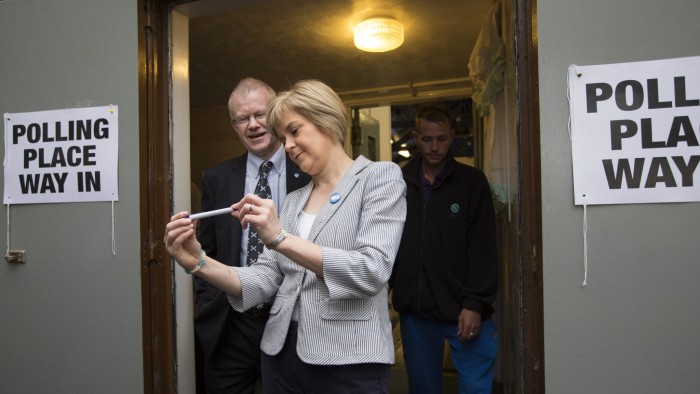Nicola Sturgeon: deputy shines as Salmond’s loyal lieutenant

Roula Khalaf, Editor of the FT, selects her favourite stories in this weekly newsletter.
Alex Salmond has been the star of the campaign for Scottish independence, but the bruising referendum battle has also given his deputy Nicola Sturgeon a chance to shine.
Less charismatic but less divisive – and more appealing to female voters – Ms Sturgeon, 44, has played the part of competent and loyal lieutenant so well that she has been widely tipped to be Mr Salmond’s successor regardless of the outcome of Thursday’s referendum.
For much of 2013, it was Ms Sturgeon as deputy first minister who did most of the hard campaign work, including live television debates against senior pro-union politicians.
Ms Sturgeon’s performance against Michael Moore, then UK secretary of state for Scotland, was cited as one reason for his replacement by the more combative Alistair Carmichael in November. But when Mr Carmichael took her on, he suffered a drubbing so comprehensive that one defender of the union called it a “gruesome spectacle”.
State-school educated with a degree and law diploma from the University of Glasgow, Ms Sturgeon combines the Scottish stereotype of a tough west coast lady with grasp of detail and sharp debating skills. Rivals and journalists have dubbed her a “nippy sweetie”, a local term for a sharp-tongued female.
Many voters see her as more down-to-earth than Mr Salmond. An Ipsos Mori poll in June gave Ms Sturgeon a net satisfaction rating of 13 points, compared with 5 points for her boss.
“I prefer Nicola Sturgeon,” said a sales office worker at an Ayrshire company visited this week by Mr Salmond. “She speaks more at our level.”
Ms Sturgeon joined the Scottish National party as a teenager and is a passionate believer in independence, though one who bases her arguments on issues of democracy and policy rather than romantic ideals of nationhood. Vocal on social justice and childcare, she stands towards the left of the SNP’s wide spectrum of ideological opinion.
In depth

Scotland will decide in a referendum to be held on September 18 whether or not to end the 307-year-old union with England
Further reading
As deputy, many analysts say she complements her boss. It fell to Ms Sturgeon, for example to reveal in 2012 that the Scottish government did not have legal advice on EU membership after independence, even though Mr Salmond appeared to suggest that it did.
James Mitchell, a veteran observer of the SNP and author of The Scottish Question, says Mr Salmond has been fortunate to have a deputy who is “more than capable” of standing up to him in private, while being impeccably supportive in public.
Indeed Prof Mitchell says Ms Sturgeon might have matched Mr Salmond’s performance if she had the leading role. “I think his deputy is even more impressive than he is,” he says.
Ms Sturgeon may get a chance to demonstrate that she can lead. Mr Salmond has made clear he plans to complete his term as first minister regardless of the referendum outcome. But some long-time associates say he may let someone else lead the party into the 2016 Scottish parliament election.
Ms Sturgeon is the favourite though some analysts say she suffers one obvious failing – the lack of a “hinterland” outside politics. She is married to the SNP’s chief executive Peter Murrell and shows little sign of non-political enthusiasms.
Ms Sturgeon has admitted to a passion for Danish TV – but one of a predictably political flavour. Emails released under a freedom of information request last year showed her staff scrambling to arrange a meeting with Sidse Babett Knudsen, star of the Danish political drama Borgen.
At the subsequent public encounter, Ms Sturgeon made clear there was a nationalist edge to her affection for the hit series. “I like it because I suppose, in Denmark, it gives us a glimpse of the kind of country we might be: a small country making a big impact,” she said.
Comments